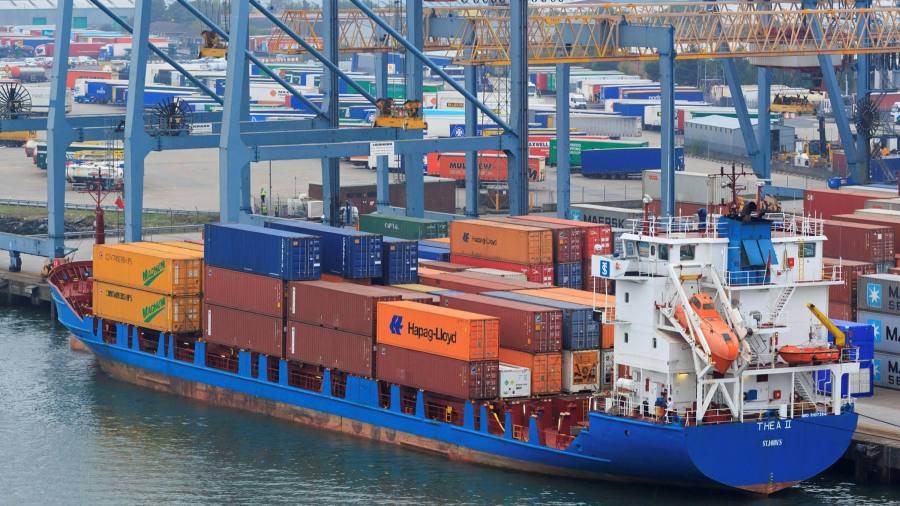The UK government has taken tentative steps to flesh out what Brexit checks will be needed for Northern Ireland’s trade with Great Britain, in the face of a clamour from business in the region for detail on future trade with its biggest market.
HM Revenue & Customs told hauliers and ferry operators this week that it will begin trialing a new online system in the autumn to assess what shipments will face customs checks as they arrive in Northern Ireland from Britain.
With just over six months to go before implementation, the timeline for resolving this knotty question is running out rapidly. It is just one of numerous unresolved issues around the region’s future trading status that will be a top agenda item when the Brexit joint committee of UK and EU officials meets on Friday.
UK officials told Northern Ireland business leaders on Wednesday that lorries leaving Britain for Northern Ireland would need HMRC clearance before embarking on ferries, with drivers having to present shipment codes to ferry operators, who in turn would submit them online via the new customs portal. While at sea, HMRC would assess which trucks require physical inspection when they arrive in Northern Ireland.
“They’re shedding some light on the question. We were crying out for this type of engagement,” said Séamus Leheny, policy manager for Northern Ireland at the Freight Transport Association.
“It’s going to be a major change for hauliers, ferry operators and for traders as well,” he said.
And there are plenty of questions that need answering before the region can start adapting to its new status. The head of Belfast Harbour, the region’s biggest port, said he urgently needs clarity on whether he will have to expand facilities to allow new customs and agrifood checks on shipments arriving into the region.
Joe O’Neill, the harbour’s chief executive, said the existing facilities may be able to cope with a “modest enhancement” but “if it’s a material change in the volumes of checks, that clearly may call in the need for a much-enhanced or a new facility and we’d need to be having conversations immediately in that regard”.
Decisions are needed rapidly because the transition period — during which the UK continues to apply EU’s rules — is set to end on December 31, unless Boris Johnson seeks an extension by next month, something the prime minister has said he will not do.
Settling the region’s future is crucial because of a protocol in the UK’s withdrawal treaty with the EU that commits to maintaining an open border between Northern Ireland and the Irish Republic. The instrument is designed to protect the 1998 Good Friday Agreement that ended decades of political violence in the region.
The stalemate in the wider UK-EU talks over a free trade agreement have led to renewed fears of a messy no-deal scenario at the end of the year, which would pile yet more pressure on companies in Northern Ireland that still don’t know how the protocol will operate.
It took years of fractious talks for the UK and EU to agree last autumn to create a regulatory border in the Irish Sea that would allow Northern Ireland to abide by the same EU trading regime as the republic, while remaining part of the UK.
This means a new frontline role for the 200-acre port complex at the mouth of river Lagan in Belfast, which handles 70 per cent of the region’s seaborne trade.
Michael Gove, UK Cabinet Office minister, proposed a “light touch” regime in a paper last month but it was widely criticised for lacking detail.
The NI Business Brexit Working Group — which includes trade bodies for retailers, manufacturers and freighters — raised 67 issues in a paper last week, covering areas such as the frequency and cost of any checks, where duty has to be paid and the impact on cash flow depending on how any rebate system might work. “There is a need to move from ambitions to technical detail very quickly,” it said.
Declan Billington, chief of John Thompson, the region’s biggest animal feed processor, said: “We need to see the mechanics of what they’re proposing to see how we can manage them — and we’ve still seen nothing.”
But the lack of detail is not the only problem. The UK government’s insistence that it wants a “light touch” regime with “very minimal” checks appears incompatible with the EU’s desire to protect the bloc’s customs union.
And any shift by London away from its minimalist position could complicate the delicate political balance in Northern Ireland.
The Democratic Unionists, Northern Ireland’s biggest pro-British party, originally forcefully rejected the idea of a regulatory border in the Irish Sea. But the party led by Arlene Foster, first minister of the region’s devolved government, has since softened its stance.
Edwin Poots, a senior DUP minister, recently said access to both UK and EU markets could be advantageous but stressed that was dependent on only minimal checks being in place.
The economic damage caused by the coronavirus lockdown made the situation all the more urgent, according to Aodhán Connolly, director of the Northern Ireland Retail Consortium. “We had said at the start of the year that this was a Herculean task to have everything ready by the start of next January. It has only got harder since then,” he said.



